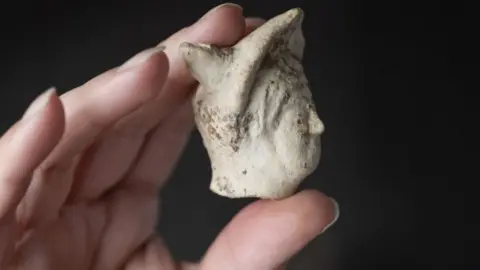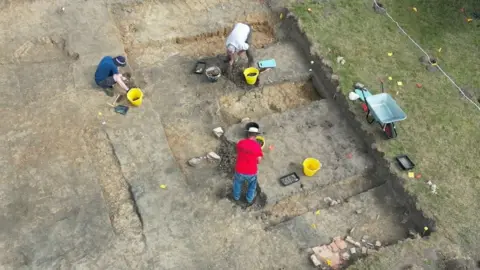Smallhythe Place: Rare Roman head of Mercury found during dig
 National Trust
National TrustAn "incredibly rare" Roman head of Mercury has been discovered during an archaeological dig.
The find was made during excavations at the site of a medieval shipyard at Smallhythe Place, in Tenterden, Kent.
Roman figurines in pipeclay were mainly used for private religious practice and placed in the graves of children.
Fewer than 10 pipeclay heads are believed to have survived from Roman Britain, according to the National Trust.
Smallhythe Place has been the subject of investigations for several years by archaeologists undertaking research on the shipyard by the River Rother, which was one of the most significant royal shipbuilding centres of medieval England.
As part of their excavations they uncovered a previously unrecorded Roman settlement, dating from 1st to 3rd Century AD.
The 5cm-tall (2in) head of Mercury was discovered with no body.
But evidence suggests that deliberately breaking some figurine heads was an important ritual.
 National Trust
National TrustNational Trust archaeologist Nathalie Cohen said: "To come across a head of a figurine of Mercury, in pipeclay, is incredibly rare.
"The head is clearly visible as Mercury, with his winged headdress.
"We sadly did not find the remaining part of the figurine."
Dr Matthew Fittock, an expert on ceramic figurines in Roman Britain, said: "Finds like this at Smallhythe provide an extremely valuable insight into the religious beliefs and practices of the culturally mixed populations of the Roman provinces."
The head, along with other recently excavated artefacts, is to go on display at Smallhythe Place from 28 February.

Follow BBC South East on Facebook, on X, and on Instagram. Send your story ideas to [email protected].
